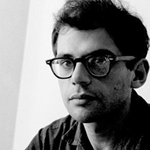MSL Evening School Sem 1 2024
A 10-Week Workshop taught in-person March-May
The Melbourne School of Literature is proud to present the Semester 1 Program. The workshop is 20 hours in length. All classes will be in person at the Kathleen Syme Centre in Carlton. Distance enrolment will be audio access only.
When: 5 March - 21 May
Where: Kathleen Syme Centre, 251 Faraday St, Carlton.
Distance Enrolment
Please note that for the Melbourne School of Literature semester 1 program, the MSCP is unable to offer online distance enrolment via zoom. However, the lecture given in the first hour of the workshop is being recorded in audio format only and will be available for distance students to access at the end of the class. Access to the recorded lectures will be provided via the online box portal. All payment must be made via credit card during enrolment.
MSL Semester 1 Program
Workshop: 2 hours per week for 10 weeks
Course Description
 “Mind is shapely, Art is shapely”: Practicing Beat Poetics
“Mind is shapely, Art is shapely”: Practicing Beat Poetics
Lecturer: George Mouratidis
Starts: Tues 6:00-8:00pm 5 March
Full Schedule: March 5, 12, 19, 26, April 2, (Break April 9 and 16), 23, 30, May 7, 14, 21
Location: Kathleen Syme Library, Carlton. .
In the mid-20th century, beneath the state-sanctioned mythos of American/Western exceptionalism, abundance and “freedom” were the horrors of WWII and Jim Crow, the terrors of Cold War anxiety and paranoia, and the occlusion of “outsiders” – along lines of race, gender, sexuality, and class – from a gatekept public discourse, culture, and “art.” Sound familiar? There was (as there continues to be) a deep split between private knowledge/feeling and public avowal maintained by a military-industrial complex, institutional demagoguery, and a conservatism and mass-conformity borne of fear and wilful ignorance. This “Syndrome of Shut Down” as Allen Ginsberg called it, was indeed embodied by the exclusive, stolid, and staid academic literary culture dominant at that time. The New Critics and New York intellect were the gatekeepers. There have since been others.
However, emerging and developing over subsequent decade was what Lawrence Ferlinghetti called a “revolution in consciousness” – a counter-culture – in direct opposition to such a political and cultural climate of existential crisis, inadvertently dubbed “Beat.” This broad and diverse culture/mo(ve)ment was the latest iteration in a continuum of cultural and literary dissidence, iconoclasm, experimentation, bohemianism, and this beat goes on. Building on classic and modern traditions and avant-gardes, the Beats sought to create more radical, “authentic” artforms and poetics that engage a self-in-flux, to dismantle this fallacious binary of private and public, and reclaim the human – the body, mind, heart, soul – in a dehumanising, hyper-mediated capitalo-imperialism-run-amok. Sound familiar?
Just as Rumi wrote in the 13th century “If you’re unwilling to undress don’t enter into the stream of Truth. Stay where you are,” Jack Kerouac insisted on “No fear or shame in the dignity of yr experience, language & knowledge” and, like all his Beat consociates, sought this Truth on the road.
This semester “in the drear light of zoo” we will each week be exploring, digging, and experimenting with some of the different forms and techniques of this counter-poetics from a broad and diverse range of “Beat” writers, utilising text, live reading, sound-recording, and film. By keeping a free-form “Beat journal” throughout the course as the source of our creative writing – poetry, prose, notes, rants, dreams, sketches, experiments, found material, anything – we will workshop, collaborate, and perform our writing, some of which students will choose as the material for a “little magazine” to be produced by the class.
Holy the bop apocalypse!
Tools: A notebook (any size/type that works for you) and a pen.
Reading (prior to semester):
- Walt Whitman. “Preface.” Leaves of Grass (1855)
- Jack Kerouac. “Essentials of Spontaneous Prose” (1957) ; “Belief & Technique for Modern Prose” (1959)
- Denise Levertov. “Some Notes on Organic Form” (1965)
- Jones, LeRoi. “How You Sound??” from “Statements on Poetics.” The New American Poetry 1945-1960. Edited by Donald Allen. 1960; University of California Press, 1998, pp. 424-425
COURSE SCHEDULE
NOTE: In keeping with the spirit of spontaneity, readings (text and other material) will be provided from week to week during the course.
Week 1
“The unspeakable visions of the individual”: spontaneity, candour, “confession,” idiosyncrasy, idiomatic/scatological “realism,” becoming = authenticity
Week 2
“I sing the body electric”: demystifying the body, exploring the texture of consciousness, liberating sensorium – eye, ear. voice, speech
Week 3
“Blow! –– now! –– your way”: transmitting the beat, from blues roots and modern jazz prosody and improvisation to performance and spoken word
Week 4
“Holy! Holy! Holy!”: rants, visions, revelations, prophecies, ecstasies
Week 5
“Accept loss forever”: narratives and counter-narratives of memory, memoir, memorial, (self-)mythology
MID-SEMESTER BREAK
Week 6
“First thought, best thought” and “if you see the Buddha on the road, kill him”: Buddhist poetics, eco-consciousness, and undoing ego
Week 7
“The diamonds in the sidewalk”: the writer as traveler, flaneur, and “recording instrument”
Week 8
“Word Virus”: Cut-ups, fold-ins, and the “Third Mind” – breaking the forms of “control”
Week 9
“O Bomb I love you”: irony, satire, parody, “routines,” and anti-manifestoes
Week 10
“Fuck You / A Magazine of the Arts”: “little magazines,” broadsides, leaflets, street-sheets – DIY publishing outside the money-machinery of “Moloch”
